Mindfulness
Resources
Style
Planning
View All
Written by: Lauren Chamberlain
Edited and Reviewed By: Anabelle Clebaner MS, RDN
Iodine is a powerhouse nutrient that plays a vital role in thyroid function, hormone balance, and reproductive health. Despite its importance, many people—especially women—don’t get enough of it, leading to potential health complications. Beyond its well-known effects on thyroid function, recent research suggests that iodine plays a role in glucose metabolism, insulin sensitivity, and fertility. In this post, we’ll explore iodine’s impact on the body, its connection to thyroid and reproductive health, and why you should consider testing your iodine levels!
Iodine and the Thyroid: A Critical Connection

The thyroid gland depends on iodine to produce hormones that regulate metabolism, energy levels, and overall endocrine balance. Here’s how it works:
- Thyroxine (T4): Contains four iodine molecules and serves as a storage form of thyroid hormone.
- Triiodothyronine (T3): Contains three iodine molecules and is the active thyroid hormone that influences metabolism and energy levels.
When you consume iodine, it gets absorbed in the gastrointestinal tract and transported to the thyroid via the sodium-iodide symporter (NIS). If your body detects low thyroid hormone levels, the pituitary gland releases thyroid-stimulating hormone (TSH) to prompt the thyroid to absorb iodine and produce more T4, which then converts into the active T3.
Why Does TSH Increase with Iodine Supplementation?
A rise in TSH after starting iodine supplements is often misunderstood. TSH stimulates more NIS molecules, helping transport iodine into thyroid cells. A temporary increase in TSH is a normal response, not necessarily a sign of thyroid dysfunction. However, excessive iodine intake can paradoxically impair thyroid function by triggering hypothyroidism or autoimmune thyroiditis. This is why careful monitoring through the use of a health professional is essential.
Iodine’s Role in Women’s Health

Beyond the thyroid, iodine plays a crucial role in reproductive health, hormone balance, and even breast tissue integrity. Here’s how:
Ovulation & Progesterone Production
Iodine is essential for ovarian function because the ovaries store a lot of iodine because our growing follicles take up iodine to grow properly. Studies suggest that iodine deficiency may contribute to menstrual irregularities and impaired ovulation, potentially affecting fertility.
Endometriosis & Estrogen Dominance
Iodine helps regulate estrogen metabolism by promoting the breakdown of estrogen into more favorable metabolites. This may help reduce inflammation, fibrocystic breast changes, and the risk of estrogen-dominant conditions like endometriosis.
Breast & Uterine Health
Iodine accumulates in breast and uterine tissues, where it supports cellular integrity and may protect against fibrocystic breast disease. A deficiency in iodine has been linked to an increased risk of breast cancer due to impaired estrogen metabolism and oxidative stress.
Pregnancy & Fetal Development
Iodine is crucial during pregnancy, as it supports fetal brain development, prevents cretinism, and reduces the risk of miscarriage and low birth weight. A deficiency in pregnancy can lead to intellectual disabilities, developmental delays, and even maternal hypothyroidism, which can have long-term effects on the child.
Iodine Absorption & Halogens: A Competitive Battle

Iodine belongs to the halogen family, which includes fluorine, chlorine, and bromine. Unfortunately, these elements have similar chemical makeups so they compete with iodine for absorption and can erroneously bind to iodine receptors, potentially leading to deficiency:
- Fluoride (found in tap water and toothpaste)
- Bromine (found in baked goods and flame retardants)
- Chlorine (found in drinking water and pools)
This means that even if you consume iodine-rich foods, environmental exposure to these halogens could impact absorption.
Iodine’s Role in Glucose Metabolism and Insulin Sensitivity
Emerging research suggests that iodine may play a crucial role in glucose metabolism and insulin sensitivity. One potential mechanism involves iodine’s interaction with peroxisome proliferator-activated receptor-γ (PPAR-γ), a nuclear receptor that regulates lipid and glucose metabolism. PPAR-γ activation has been associated with improved insulin sensitivity by enhancing glucose uptake in peripheral tissues and modulating adipocyte differentiation. This suggests that iodine may contribute to metabolic health by influencing pathways that regulate insulin signaling.
However, the relationship between iodine and glucose metabolism is complex. While adequate iodine intake may support insulin function, excessive iodine consumption has been linked to cytotoxic effects on pancreatic beta cells, which are responsible for insulin secretion. High iodine levels can induce oxidative stress and apoptosis (cell death) in these cells, potentially impairing insulin production and increasing the risk of glucose dysregulation. Additionally, iodine excess has been associated with thyroid dysfunction, which can indirectly affect insulin sensitivity and glucose homeostasis through alterations in thyroid hormone levels.
These findings highlight the need to maintain optimal iodine intake, as both deficiency and excess can have metabolic consequences. Further research is needed to clarify the precise mechanisms by which iodine influences insulin function and to determine safe and effective dietary recommendations for individuals at risk of metabolic disorders.
Who Might Need More Iodine?
While iodine deficiency can affect anyone, certain populations are at higher risk:
- Women with hormonal imbalances, endometriosis, or estrogen dominance
- Pregnant and breastfeeding women (who require higher iodine intake)
- Individuals with frequent exposure to fluoride, chlorine, and bromine
- People with thyroid dysfunction or subclinical hypothyroidism
- Those with blood sugar imbalances or insulin resistance
If you suspect iodine deficiency, a urinary iodine clearance test can help assess your levels. We only absorb 10% of iodine in the gut when levels are sufficient, so we want 90% excreted in the urine.
Key Thyroid Markers to Test

Relying on TSH alone isn’t enough to evaluate thyroid function. If you’re experiencing fatigue, weight gain, cold intolerance, or brain fog, consider testing:
- Free T3 (FT3): The active thyroid hormone–shows how much thyroid hormone is being converted
- Free T4 (FT4): The inactive form of thyroid hormone–shows how much thyroid hormone your thyroid is producing
- Reverse T3 (rT3): Puts the breaks on thyroid hormone conversion–indicates stress or inflammation
- Thyroid Antibodies (TPOAb, TgAb): Markers for autoimmune thyroid conditions like Hashimoto’s or Graves’ Disease
Before Increasing Iodine Intake

Before making changes to your iodine intake—whether through food sources or supplements—it’s essential to establish a strong foundation for overall health. Iodine metabolism is influenced by multiple factors, including stress, sleep, and nutrient status, so addressing these areas first can help your body utilize iodine more effectively. Consulting with a healthcare professional is also key to ensuring that supplementation is appropriate for your individual needs.
Consider these important questions before increasing iodine intake:
Am I eating enough?
- Chronic under-eating can contribute to nutrient deficiencies, including iodine.
Am I under high stress?
- Elevated stress levels increase cortisol, which can interfere with thyroid function and iodine metabolism.
Am I getting proper light exposure and balancing my circadian rhythm?
- Sunlight helps regulate hormone production, including thyroid hormones, which depend on iodine.
Am I getting quality sleep?
- Poor sleep can disrupt endocrine function, making it harder for your body to utilize iodine efficiently.
Am I going through a particularly demanding or stressful season of life?
- Major life changes, illness, or intense physical demands can impact overall nutrient needs.
Am I deficient in other key minerals?
- Iodine works in synergy with selenium, zinc, magnesium, and iron. Deficiencies in these minerals can impair iodine’s role in thyroid function and metabolism.
Since iodine is just one piece of the puzzle, it’s crucial to build a strong nutritional and lifestyle foundation before increasing intake. Addressing these factors first will help your body better absorb and utilize iodine while minimizing potential risks associated with excess or imbalance.
Safe Iodine Supplementation: What to Consider
Iodine supplementation isn’t a one-size-fits-all approach. Here are some key factors:
- Start Low and Go Slow: Gradually increase iodine intake to allow your body to adjust.
- Pair with Selenium: Selenium helps balance iodine metabolism and prevents thyroid inflammation.
- Ensure Adequate Sodium Intake: Unrefined salt supports iodine transport.
- Get Tested First: Urinary iodine testing and hair tissue mineral analysis (HTMA) can provide insights into your iodine status.
Symptoms of Iodine Deficiency
Signs of iodine deficiency can be subtle but may include:
- Fatigue and sluggishness
- Weight gain and slow metabolism
- Cold intolerance
- Dry skin and brittle nails
- Hair thinning
- Brain fog and poor concentration
- Depression and mood swings
- Irregular menstrual cycles
Best Dietary Sources of Iodine

To maintain healthy iodine levels, include these foods in your diet:
- Seaweed (kelp, nori, wakame, dulse): The richest natural source of iodine.
- Fish and shellfish (cod, tuna, shrimp, oysters): Packed with iodine and essential minerals.
- Dairy products (milk, yogurt, cheese): Often fortified with iodine.
- Eggs: A good source, especially from pasture-raised hens.
Final Thoughts
Iodine is an essential yet often overlooked nutrient that plays a pivotal role in thyroid function, hormone balance, metabolic health, and reproductive function. If you struggle with fatigue, hormonal imbalances, insulin resistance, or fertility concerns, it may be worth assessing your iodine levels and ensuring you’re getting enough from your diet or supplements. However, balance is key—too much iodine can be just as harmful as too little.
By understanding how iodine influences your health, you can take proactive steps to optimize your intake and support overall well-being.
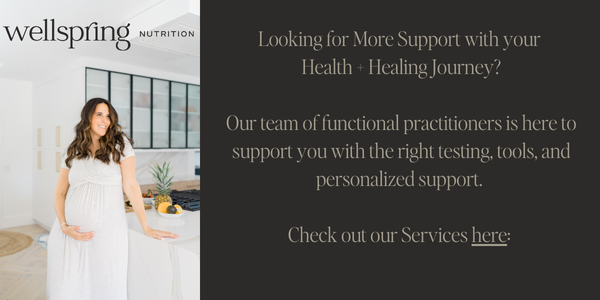
Sources:
- https://pmc.ncbi.nlm.nih.gov/articles/PMC6373336/
- https://pmc.ncbi.nlm.nih.gov/articles/PMC8709459/
- https://pmc.ncbi.nlm.nih.gov/articles/PMC3063534/#:~:text=Iodine%20is%20mostly%20concentrated%20in,stored%20in%20the%20thyroid%20gland
- https://pmc.ncbi.nlm.nih.gov/articles/PMC10813031/#:~:text=Conclusions:%20Iodine%20could%20influence%20glucose%20metabolism%20in,cause%20cytotoxic%20damage%20to%20pancreatic%20beta%20cells
- https://www.news-medical.net/news/20240321/Exploring-the-role-of-iodine-in-obesity-diabetes-and-other-metabolic-conditions.aspx#:~:text=Iodine%20also%20interacts%20with%20peroxisome%20proliferator%2Dactivated%20receptor%2D%CE%B3,and%20glucose%20metabolism%20by%20improving%20insulin%20sensitivity
- https://pmc.ncbi.nlm.nih.gov/articles/PMC7511676/
- https://academic.oup.com/humrep/article/36/2/265/6025913?login=false
- https://pubmed.ncbi.nlm.nih.gov/29340704/
- https://www.sciencedirect.com/science/article/abs/pii/S0739724005000433
- https://pmc.ncbi.nlm.nih.gov/articles/PMC3063534/
- https://pmc.ncbi.nlm.nih.gov/articles/PMC5327366/
- https://www.mdpi.com/1422-0067/22/3/1228#:~:text=Our%20group%20has%20found%20similar,tissues%20that%20take%20up%20iodine
- https://pubmed.ncbi.nlm.nih.gov/31284874
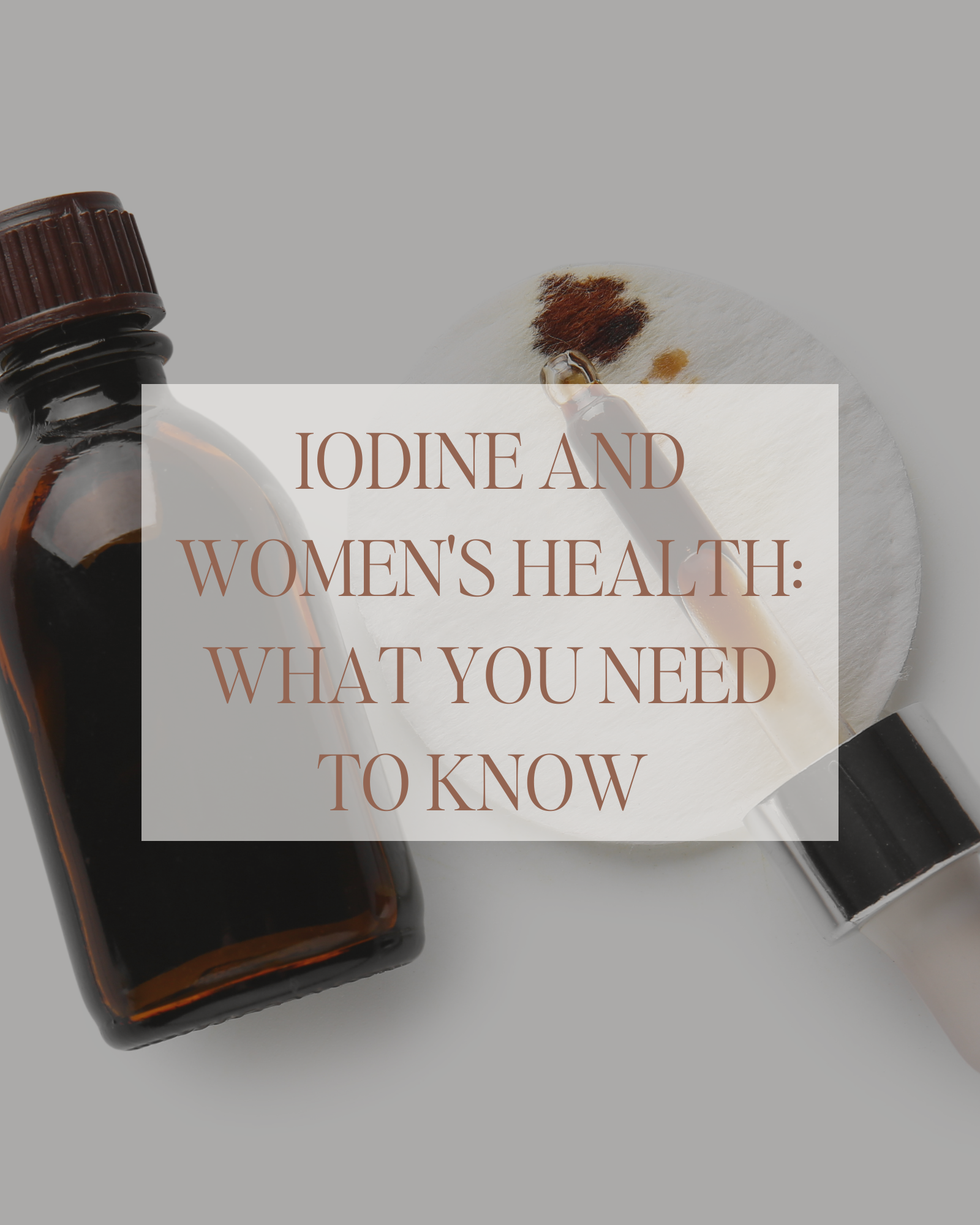
When it comes to fertility, we often focus on hormones like estrogen, progesterone, and follicle-stimulating hormone (FSH). However, there’s another player in the hormonal orchestra that deserves our attention: cortisol.
Known as the “stress hormone,” cortisol plays a significant role in the body’s response to stress. While it’s essential for survival, chronic stress and elevated cortisol levels can wreak havoc on hormonal balance, potentially leading to infertility.
In this blog, we’ll explore the connection between cortisol and reproductive health, discuss how chronic stress impacts the body, and offer actionable strategies to support cortisol balance and improve fertility outcomes.

What Is Cortisol?
Cortisol is a steroid hormone produced by the adrenal glands, which sit atop the kidneys. It’s best known for its role in the body’s “fight-or-flight” response, helping us react to stressors by:
- Increasing blood sugar levels for immediate energy.
- Enhancing brain function to improve focus and decision-making.
- Suppressing non-essential functions, like digestion and reproduction, to prioritize survival.
While cortisol is essential in acute stress situations, problems arise when stress becomes chronic, leading to persistently elevated cortisol levels.
How Does Cortisol Affect Reproductive Health?
Chronic stress and elevated cortisol levels can interfere with fertility in several ways:
1. Disruption of the Hypothalamic-Pituitary-Adrenal (HPA) Axis
The HPA axis is the body’s central stress response system, involving the hypothalamus, pituitary gland, and adrenal glands. Chronic stress can dysregulate this system, leading to:
- Suppressed gonadotropin-releasing hormone (GnRH) production, which reduces FSH and luteinizing hormone (LH) levels.
- Disrupted ovulation and irregular menstrual cycles.
- Impaired communication between the brain and reproductive organs.
2. Cortisol’s Impact on Sex Hormones
Cortisol production requires cholesterol, the same precursor used to produce sex hormones like estrogen and progesterone. When the body prioritizes cortisol production during stress, it diverts resources away from sex hormone synthesis.
It does so by upregulating a promoter in the brain→ This increases aromatase activity (an enzyme that produces estrogen in the body) which determines how much testosterone will turn into estradiol (E2) → when there is more E2, the hypothalamus suppresses GnRH→ this tells the pituitary gland to make LH→ this then tells LH to make lutein cells to make progesterone. This phenomenon, often referred to as the “pregnenolone steal,” can lead to hormone imbalances when not functioning properly.
These hormone imbalances can result in:
- Follicles failing to develop properly.
- The body unable to choose a dominant follicle to stimulate, resulting in an anovulatory cycle.
- Low progesterone levels, which are critical for maintaining a healthy uterine lining and supporting early pregnancy.
- Poor corpus luteum development which can lead to difficulties getting pregnant or staying pregnant.
- Elevated androgens, which can disrupt ovulation and contribute to conditions like polycystic ovary syndrome (PCOS).
3. Effects on Egg and Sperm Quality
Chronic stress increases oxidative stress in the body, damaging cells, including eggs and sperm. This can lead to:
- Reduced egg quality, affecting the ability to conceive and maintain a healthy pregnancy.
- Lower sperm count and motility in men.
4. Disruption of Uterine Environment
Elevated cortisol levels can alter the uterine environment, making it less receptive to implantation. Additionally, stress-induced inflammation can further impair fertility by disrupting the delicate balance needed for successful conception and pregnancy.
Signs of Cortisol Imbalance
Recognizing the signs of cortisol imbalance is crucial, as chronic stress and elevated cortisol levels can significantly impact both overall health and fertility.

Here is a list of commonly known symptoms:
- Weight gain, particularly around the abdomen.
- Difficulty falling or staying asleep.
- Mood swings, anxiety, or depression.
- Irregular menstrual cycles or missed periods.
- Reduced libido or sexual dysfunction.
- Sugar cravings or unstable blood sugar levels.
Beyond the commonly known symptoms, additional indicators include:
Cognitive Impairments
Elevated cortisol can interfere with cognitive functions, leading to:
- Brain Fog: Difficulty concentrating or thinking clearly.
- Memory Issues: Challenges in recalling information or forming new memories.
These cognitive disruptions can affect daily functioning and overall quality of life.
Physical Manifestations

High cortisol levels may present physically as:
- Bloating: Disrupted salt and water balance causing fluid retention.
- Hair Loss: Cortisol can force hair follicles into a resting phase, leading to shedding.
- Vision Problems: Spikes in cortisol may disrupt blood flow to the eyes, potentially causing vision issues.
These physical signs can often be overlooked but are important indicators of hormonal imbalance.
Sensory Disturbances
Individuals might experience:
- Tinnitus: Ringing or buzzing in the ears linked to cortisol’s effect on the auditory system.
- Temperature Sensitivity: Sudden hot or cold flashes due to cortisol’s impact on estrogen regulation.
Such sensory issues can be distressing and may contribute to increased stress levels.
Cardiovascular Symptoms
Chronic stress and high cortisol can lead to:
- Elevated Blood Pressure: Increased strain on the cardiovascular system.
- Chest Pains: Anxiety-induced discomfort or tightness in the chest.
These symptoms highlight the systemic impact of cortisol imbalance on the body.
Immune System Suppression
Persistent high cortisol can weaken the immune response, resulting in:
- Frequent Infections: Increased susceptibility to colds and other illnesses.
- Slow Wound Healing: Delayed recovery from injuries or surgeries.
A compromised immune system further complicates overall health and well-being.
If you’re experiencing these symptoms, especially alongside fertility challenges, addressing cortisol balance is essential. Implementing stress management techniques, optimizing sleep, and seeking guidance from healthcare professionals can help restore hormonal harmony and improve reproductive health.
How DUTCH Testing Can Help
The DUTCH (Dried Urine Test for Comprehensive Hormones) test is a powerful tool for assessing cortisol levels and patterns throughout the day. Unlike traditional blood tests that provide a snapshot, the DUTCH test offers a comprehensive view by evaluating:
- Total cortisol production: This measures the overall amount of cortisol your body produces in a 24-hour period, providing a clearer picture of adrenal function.
- Cortisol’s diurnal rhythm: This reveals how cortisol fluctuates throughout the day, helping identify patterns like flatlined cortisol or nighttime spikes, which can interfere with sleep and recovery.
- Metabolized cortisol: This indicates how efficiently your body clears cortisol, providing clues about liver function and overall hormonal processing.
In addition to cortisol, the DUTCH test evaluates other critical markers that influence fertility and overall health, including:
- DHEA and DHEAS levels: These are precursors to sex hormones and play a crucial role in counterbalancing cortisol. Low levels of DHEA or DHEAS can signal adrenal exhaustion and contribute to hormone imbalances like low progesterone or estrogen dominance.
- Progesterone and estrogen metabolism: By analyzing their metabolites, the DUTCH test can identify imbalances that impact ovulation, uterine health, and overall fertility.
- Nutritional organic acids: These markers provide insights into nutrient deficiencies, such as B vitamins and magnesium, which are critical for adrenal health and hormonal balance.
- Neurotransmitter metabolites: By evaluating markers like serotonin and dopamine breakdown products, the test sheds light on how stress affects mood and mental health, which are closely tied to hormonal regulation.
- Melatonin levels: This hormone regulates sleep-wake cycles and has a profound impact on cortisol rhythms. Disrupted melatonin levels can exacerbate cortisol imbalances and impair recovery.
- 8-OHdG (8-hydroxy-2′-deoxyguanosine): This marker of oxidative stress reveals the extent of cellular damage, which can affect egg and sperm quality and overall reproductive health.
By providing such detailed insights, the DUTCH test empowers practitioners to develop highly personalized interventions, targeting the root causes of hormonal imbalances and supporting optimal fertility outcomes.
Strategies to Balance Cortisol and Improve Fertility
The good news is that cortisol imbalances can often be addressed through targeted lifestyle changes and nutritional support. Here are some strategies:
1. Prioritize Stress Management
Effective stress management is crucial for cortisol regulation. Consider incorporating:
- Mindfulness practices: Techniques like meditation, deep breathing, and yoga can reduce cortisol levels and promote relaxation.
- Physical activity: While exercise is beneficial, opt for low-impact activities like walking or stretching if you’re dealing with high stress, as intense workouts can elevate cortisol further.
- Therapeutic outlets: Journaling, therapy, or connecting with supportive friends can help process and alleviate stress.
2. Support Adrenal Health with Nutrition

Adrenal-supportive nutrition focuses on stabilizing blood sugar levels and providing the nutrients needed for hormone production. Key recommendations include:
- Balanced meals: Combine protein, healthy fats, and complex carbohydrates to maintain steady blood sugar levels.
- Magnesium-rich foods: Leafy greens, nuts, and seeds can help regulate cortisol production.
- Vitamin C: Found in citrus fruits, bell peppers, and strawberries, vitamin C supports adrenal function and reduces oxidative stress.
- Adaptogens: Herbs like ashwagandha, rhodiola, and holy basil can help modulate cortisol levels.
3. Optimize Sleep
Sleep is a critical factor in cortisol regulation. To improve sleep quality:
- Establish a consistent sleep schedule.
- Create a calming bedtime routine, such as reading or taking a warm bath.
- Limit screen time before bed to reduce exposure to blue light, which can disrupt melatonin production.
4. Address Inflammation

Chronic inflammation can exacerbate cortisol imbalances and impair fertility. Anti-inflammatory strategies include:
- Incorporating omega-3 fatty acids from sources like fatty fish, flaxseeds, and walnuts.
- Reducing processed foods and added sugars in your diet.
- Supporting gut health with probiotics and fiber-rich foods.
5. Work with a Functional Dietitian
A qualified functional dietitian can play a pivotal role in addressing cortisol imbalances and optimizing fertility. They offer the expertise to:
- Interpret DUTCH Test Results: A functional dietitian can comprehensively evaluate the results to identify patterns of dysregulation, such as cortisol imbalances, low DHEA, or estrogen dominance.
- Create a Personalized Plan: Based on the insights from the DUTCH test, they can design a targeted nutrition, supplement, and lifestyle strategy tailored to your specific needs.
- Address Nutritional Deficiencies: By analyzing markers like nutritional organic acids, a dietitian can identify and correct deficiencies in vitamins and minerals critical for adrenal and hormonal health.
- Incorporate Stress-Reducing Foods and Adaptogens: Functional dietitians provide guidance on incorporating adrenal-supportive foods and evidence-based adaptogenic herbs like ashwagandha and rhodiola to balance cortisol.
- Optimize Sleep and Recovery: They can suggest dietary changes, sleep hygiene tips, and melatonin supplementation (if needed) to improve your sleep-wake cycle.
- Support Antioxidant Defense: Functional dietitians can recommend foods and supplements rich in antioxidants to combat oxidative stress, protecting egg and sperm quality.
By working with a functional dietitian, you gain access to a holistic and scientifically backed approach to restoring hormonal balance, managing stress, and enhancing your fertility journey.
Conclusion
Cortisol plays a vital role in the body’s stress response, but chronic stress and elevated cortisol levels can disrupt reproductive health. By understanding the connection between cortisol and fertility, you can take proactive steps to manage stress, support adrenal health, and create a hormone-friendly environment for conception.
If you’re struggling with infertility or suspect cortisol dysregulation, consider incorporating these strategies into your routine. With the right support and interventions, it’s possible to restore balance and improve your chances of achieving a healthy pregnancy.
Sources
https://drbrighten.com/begin-to-reduce-your-stress-today
https://drbrighten.com/adrenal-fatigue
https://drhyman.com/blogs/content/podcast-ep774?_pos=24&_sid=2433629de&_ss=r https://drhyman.com/blogs/content/podcast-ep693?_pos=27&_sid=2433629de&_ss=r

Understanding PCOS: An Overview
Polycystic Ovary Syndrome (PCOS) is a multifaceted endocrine disorder that impacts a significant percentage of women during their reproductive years. Estimates suggest that PCOS affects between 4% to 18% of women worldwide, making it one of the most common hormonal disorders among women.
Characterized by a combination of symptoms, PCOS can vary widely from one individual to another. Common symptoms include irregular menstrual cycles, excessive hair growth (hirsutism), acne, and weight gain. Additionally, women with PCOS often face challenges related to insulin resistance, which can increase the risk of developing type 2 diabetes.
The exact cause of PCOS remains unclear. However, it is believed to be related to a combination of genetic and environmental factors. Hormonal imbalances, particularly an excess of androgens (male hormones that females also have), play a critical role in the development of PCOS symptoms.
Early diagnosis and management are key to mitigating the long-term health risks associated with PCOS. Common diagnostic tools include ultrasound imaging of the ovaries and blood tests to measure hormone levels. Despite its complexities, various lifestyle changes, such as diet and exercise, along with medical treatments, can help manage the condition effectively.
Understanding the intricacies of PCOS not only empowers you with knowledge but also offers a pathway to improving your overall health and well-being. With the right approach, you can manage the symptoms and live a fulfilling life.
Why Supplements Matter in Managing PCOS
Polycystic Ovary Syndrome (PCOS) is a complex endocrine disorder affecting millions of women worldwide. Symptoms such as irregular menstrual cycles, weight gain, acne, and excessive hair growth can significantly impact your quality of life. Supplements can play a crucial role in managing these symptoms effectively.
Addressing Nutrient Deficiencies: Many women with PCOS are found to be deficient in essential vitamins and minerals like Vitamin D, Magnesium, and Zinc. These deficiencies can exacerbate symptoms, making it more challenging to manage the condition. By supplementing these nutrients, you can help restore balance and support your overall health.
Hormonal Regulation: PCOS often leads to hormonal imbalances, particularly with insulin and androgens. Supplements such as Inositol and Omega-3 Fatty Acids have been shown to aid in regulating these hormones, thereby reducing symptoms like acne and excessive hair growth. Inositol, for instance, has been found to improve insulin sensitivity, which is crucial for managing PCOS.
Reducing Inflammation: Chronic inflammation is a common issue in women with PCOS, contributing to insulin resistance and other metabolic problems. Omega-3 Fatty Acids are well-known for their anti-inflammatory properties and can help reduce systemic inflammation, improving your overall metabolic health.
Improving Mental Well-being: Living with PCOS can take a toll on your mental health, leading to stress and anxiety. Supplements like Magnesium not only help with physical symptoms but also support mental well-being by promoting relaxation and better sleep. Improved sleep and reduced stress can significantly impact how you manage your PCOS symptoms day-to-day.
Ultimately, while supplements are not a cure-all for PCOS, they can be a valuable part of a comprehensive management strategy. Always consult with a healthcare professional to create a tailored supplement plan that addresses your specific needs and conditions. Taking the right supplements can help you take control of your health and mitigate the challenges posed by PCOS.
Vitamin D: The Sunshine Vitamin for Hormonal Balance
Vitamin D, often referred to as the sunshine vitamin, plays a crucial role in maintaining hormonal balance, especially for those grappling with PCOS. Many individuals with PCOS are found to have a deficiency in Vitamin D, which can compound the condition’s already complex symptoms. But what exactly makes this vitamin so vital?
Firstly, Vitamin D acts like a hormone itself, impacting the function of over 200 genes, including those involved in the regulation of the menstrual cycle and reproduction. Research has shown that adequate levels of Vitamin D can help improve insulin sensitivity, which is often a significant concern for individuals with PCOS. In essence, better insulin sensitivity can lead to more balanced blood sugar levels and reduced symptoms.
Moreover, Vitamin D also supports healthy pregnancies. Ensuring optimal levels can make a big difference for women with PCOS trying to conceive, as it helps in the regulation of menstrual cycles and the maintenance of healthy hormone levels.
So, whether you’re soaking up the sun or considering a supplement like HUM’s Here Comes the Sun Vitamin D3, incorporating this vitamin into your routine can profoundly impact your journey towards hormonal balance and overall well-being.
Inositol: A Natural Approach to Hormone Regulation
Inositol, often referred to as Vitamin B-8, plays a crucial role in managing PCOS symptoms by naturally regulating hormone levels. There are two main forms that are particularly effective for women with PCOS: Myoinositol and D-chiro-inositol.
Both forms have been shown to improve insulin-receptor activity, which can be beneficial in reducing insulin resistance—a common issue for those with PCOS. Enhanced insulin sensitivity helps to stabilize blood sugar levels and may mitigate some of the hormonal imbalances that characterize this condition.
Additionally, a combination of inositol derivatives and alpha-lipoic acid (ALA) has been demonstrated to further improve insulin sensitivity, support ovulatory function, and reduce hyperandrogenism. Hyperandrogenism, signified by elevated levels of male hormones, often leads to symptoms like hirsutism (excessive hair growth) and acne. By addressing these symptoms, inositol can contribute significantly to a better quality of life for women suffering from PCOS.
If you’re considering inositol as a supplement, it’s important to note its potential benefits aren’t limited to insulin regulation. Research suggests that inositol can help balance several other hormones related to reproductive health, offering a holistic approach to managing PCOS symptoms. This makes inositol a versatile and promising option worth discussing with your healthcare provider.
Omega-3 Fatty Acids: Reducing Inflammation and Insulin Resistance
Omega-3 fatty acids, typically found in fish oil, play a pivotal role in managing PCOS symptoms. One of their standout benefits is their ability to reduce inflammation, which is often at the crux of many PCOS-related issues. By lowering inflammation, omega-3s help to mitigate the systemic stress that can exacerbate hormonal imbalances.
But the benefits don’t stop there. Omega-3s are also known for their positive effect on insulin resistance—a common concern for those with PCOS. Insulin resistance occurs when cells in your muscles, fat, and liver don’t respond well to insulin and can’t easily take up glucose from your blood. By improving insulin sensitivity, omega-3s aid in maintaining more stable blood sugar levels, which is crucial for managing PCOS effectively.


Research suggests that regularly incorporating omega-3s can help balance lipid levels, improving overall metabolic health. This can be particularly beneficial for those with PCOS, who often face challenges related to weight management and cardiovascular health. The anti-inflammatory properties of omega-3s make them a valuable addition to your supplement regimen, especially when you are aiming to tackle the multi-faceted challenges of PCOS.
For the best results, consider adding sources of omega-3s such as fatty fish (like salmon, mackerel, and sardines) to your diet, or opt for high-quality fish oil supplements. Aim for a balanced intake to harness the full spectrum of benefits that omega-3s offer. Always consult your healthcare provider before starting any new supplement to ensure it’s right for you.
Magnesium: Combatting Stress and Improving Sleep
Magnesium plays a pivotal role in managing PCOS by aiding in stress reduction and enhancing sleep quality. This mineral is known for its natural calming effect, which can help mitigate the elevated stress levels often experienced by those with PCOS. Elevated stress can exacerbate PCOS symptoms, making magnesium supplementation particularly beneficial.
Moreover, magnesium supports proper blood sugar regulation, a critical factor for managing PCOS. This nutrient’s ability to enhance insulin sensitivity can help maintain stable blood sugar levels, potentially reducing the risk of insulin resistance—a common challenge for many with PCOS.
When it comes to improving sleep, magnesium is a game-changer. It helps regulate neurotransmitters that send signals to the brain and nervous system, creating a more conducive environment for restful sleep. Poor sleep quality can significantly impact hormone levels, worsening PCOS symptoms. By improving sleep, magnesium indirectly supports hormonal balance.
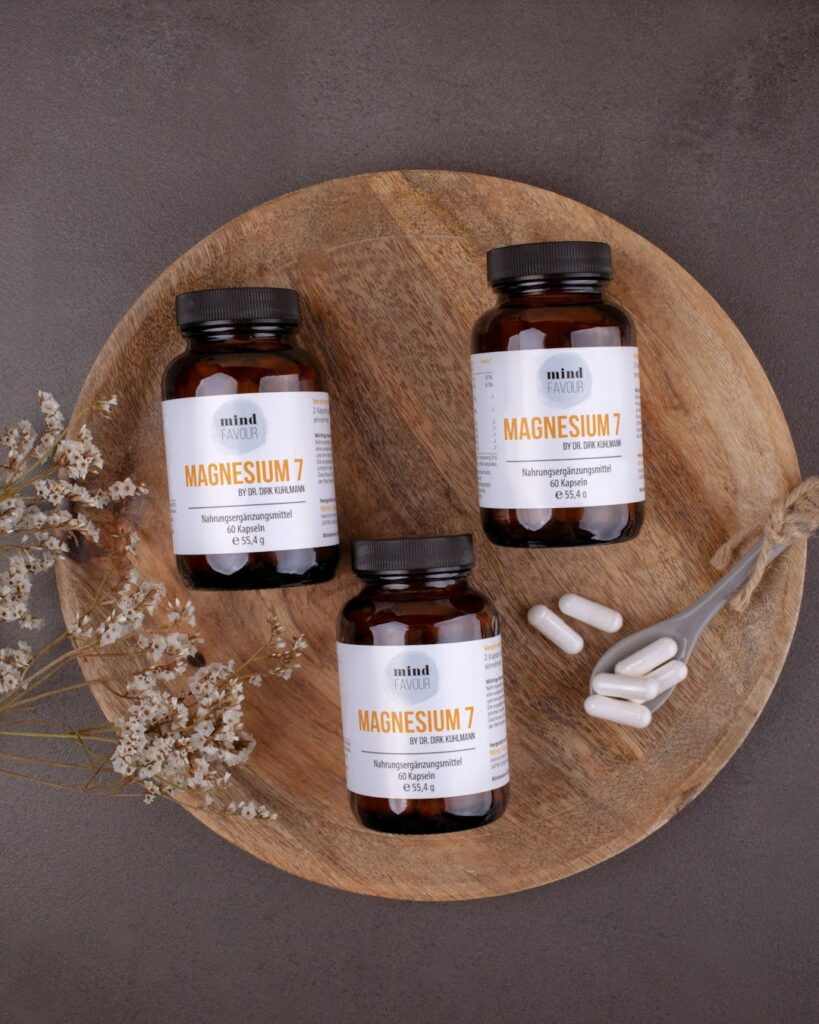
Not all magnesium supplements are created equal. Magnesium Bisglycinate is often recommended for its superior absorption and minimal digestive discomfort compared to other forms. Including this specific form of magnesium in your routine may offer the best results in combating stress, regulating blood sugar, and improving sleep quality.
Incorporating magnesium-rich foods into your diet, such as leafy greens, nuts, seeds, and whole grains, can further bolster your magnesium intake. Nevertheless, a supplement can ensure you consistently meet your daily needs, providing a robust foundation for managing PCOS symptoms effectively.
Zinc: Supporting Reproductive Health
Zinc is an essential trace mineral that plays a pivotal role in many bodily functions, including immune response, DNA synthesis, and cell division. When it comes to managing PCOS, zinc shines particularly in supporting reproductive health.
Studies have demonstrated that zinc supplementation can improve fertility and enhance reproductive function. This is particularly crucial for those with PCOS, as hormonal imbalances often lead to irregular menstrual cycles and ovulation issues. By helping to regulate the hormonal environment, zinc can promote regular ovulation and menstrual regularity, increasing the chances of conception.
In addition, zinc’s antioxidant properties help combat oxidative stress, which is often elevated in individuals with PCOS. Oxidative stress can cause cellular damage and inflammation, further complicating PCOS symptoms. By reducing oxidative stress, zinc contributes to a healthier reproductive system and overall well-being.
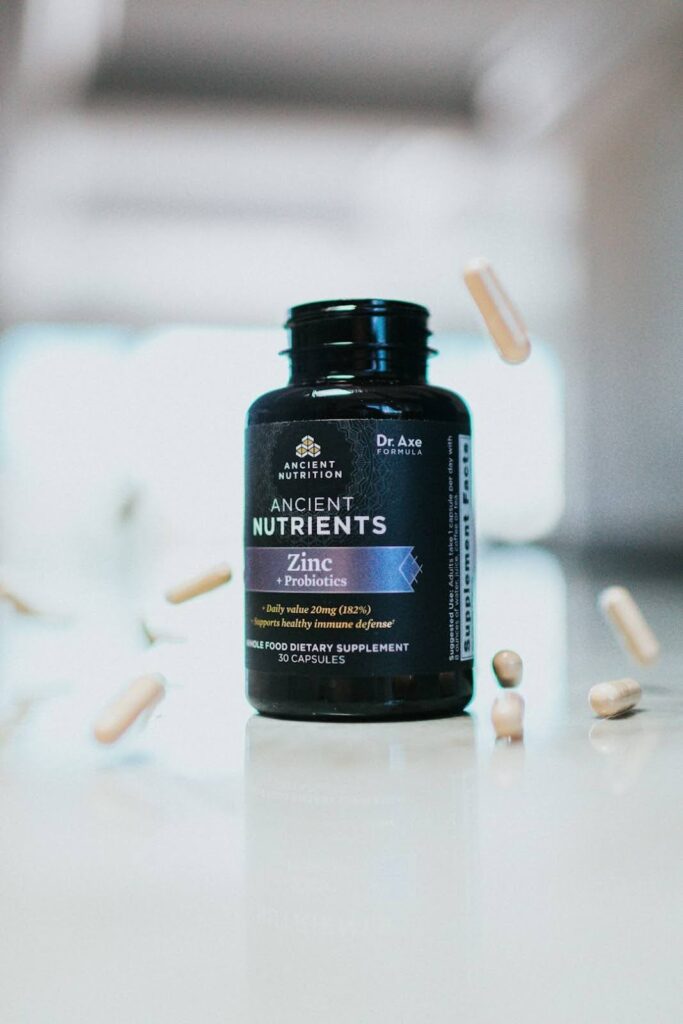
Considering the different forms of zinc supplements available, such as zinc sulfate and zinc picolinate, it’s important to choose a form that offers high bioavailability. Zinc picolinate is often recommended because it’s easily absorbed by the body, ensuring you get the maximum benefits.
Before starting any new supplement regimen, it’s wise to consult with a healthcare provider to determine the appropriate dosage and to ensure it aligns with your individual health needs. Integrating zinc into your supplement routine might just be the step you need to better manage your PCOS and support your reproductive health.
NAC – N- Acetyl-Cysteine
- Antioxidant: NAC can help restore the balance of antioxidants and inflammatory markers in women with PCOS.
- Ovulation: NAC can increase ovulation and pregnancy rates.
- Insulin: NAC may be an alternative to other insulin-lowering drugs like metformin, and may help with hyperinsulinemia in women with PCOS.
- Sex hormones: NAC can reduce testosterone levels and increase follicle-stimulating hormone (FSH) levels.
- Metabolic parameters: NAC may improve metabolic parameters in women with PCOS.
In addition to these benefits, NAC is recognized for its role in detoxification. As a precursor to glutathione, one of the body’s most powerful antioxidants, it supports the liver in removing toxins and free radicals, helping to maintain a healthy internal environment. Another noteworthy aspect is its potential in enhancing mood and mental well-being. Women with PCOS often experience mood swings and mental health issues. NAC has been studied for its positive effects on mental health, such as alleviating symptoms of anxiety and depression, thanks to its ability to regulate glutamate levels and its antioxidative properties. When looking to add NAC to your supplement regime, it’s crucial to speak with a healthcare provider first. While NAC can offer significant benefits, it’s always best to ensure it’s the right fit for your specific health needs and circumstances, especially when dealing with a complex condition like PCOS.
Herbal Allies: The Role of Spearmint and Cinnamon
When it comes to managing PCOS, nature has some incredible allies. Two standout herbs that have shown promising results are spearmint and cinnamon. These herbal allies bring more to the table than delightful flavors; they offer real benefits for women battling the symptoms of PCOS.

Spearmint: Known for its refreshing taste and aroma, spearmint has been traditionally used for its soothing properties. But did you know it also boasts significant anti-androgen effects? Studies have shown that drinking spearmint tea can help reduce elevated androgen levels, which are often responsible for unwanted symptoms like hirsutism (excessive hair growth) in women with PCOS. Consider adding Traditional Medicinals Organic Spearmint Tea to your daily routine for a natural way to support hormonal balance. Cinnamon: This well-loved spice is more than just a kitchen staple; it’s a potent tool for improving menstrual cyclicity and reducing insulin resistance. Preliminary research indicates that cinnamon can help regulate menstrual cycles in women with PCOS, making it a valuable ally in managing the condition. A pilot study also highlights cinnamon’s potential to improve parameters of insulin resistance, which is a common issue for those with PCOS.
Incorporating these herbal allies into your daily diet doesn’t have to be complicated. Enjoy a cup of spearmint tea in the afternoon, or add a sprinkle of cinnamon to your morning oatmeal or smoothies. These simple additions can make a significant difference in managing PCOS symptoms naturally.
How to Choose Quality Supplements for PCOS
Selecting the right supplements can be a game-changer in managing PCOS. However, it’s crucial to choose high-quality supplements to ensure safety and efficacy. Here are some tips to help you make informed choices:
Look for supplements that have been tested by an independent third party. Certifications such as NSF International, USP (United States Pharmacopeia), or ConsumerLab can provide added assurance of quality and purity.
Check out my Fullscript store for medical-grade supplements.
Combining Diet and Supplements for Optimal Results
Pairing the right supplements with a thoughtfully planned diet can significantly enhance your efforts in managing PCOS. It’s all about synergy – the way certain foods and supplements work together to amplify their benefits.
Focus on Whole Foods: Start with a diet rich in whole foods like fresh fruits, vegetables, lean proteins, and whole grains. These foods provide essential nutrients and fiber, which aid in stabilizing blood sugar levels and improving overall health.
Balance Your Nutrients: Incorporate foods that are high in the key nutrients found in your supplements. For instance, fatty fish like salmon can boost your intake of Omega-3 fatty acids, while leafy greens and nuts can enhance your magnesium levels. Balancing your diet this way ensures you’re getting a wide spectrum of nutrients while maximizing the impact of your supplements.
Consider Anti-Inflammatory Foods: Chronic inflammation is a common issue in PCOS. Introduce anti-inflammatory foods such as turmeric, ginger, and berries to your diet. These not only complement the action of supplements like Omega-3s but can also help in reducing overall inflammation and improving insulin sensitivity.
Limit Processed Foods and Sugars: Reducing the intake of processed foods and sugars is crucial. These can exacerbate insulin resistance and hormonal imbalances, counteracting the benefits of your supplements. Opt for natural sweeteners and whole food alternatives wherever possible.
Stay Hydrated: Hydration is often overlooked but is essential for overall health and well-being. Drinking plenty of water helps in the effective absorption of supplements and assists in maintaining metabolic processes crucial for managing PCOS.
Monitor and Adjust: Everyone’s body responds differently, so it’s important to monitor how you’re feeling and make adjustments as needed. Keep a food and supplement journal to track what works best for you and discuss these observations with your healthcare provider.
Combining a well-rounded, nutrient-dense diet with carefully selected supplements can create a powerful strategy for managing PCOS. Remember, there’s no one-size-fits-all approach – it’s about finding the right balance that works for your body.

Ever wondered what steps you should take to optimize your nutrition before starting IVF?
Well wonder no more!
Here are 3 steps to preparing for your IVF journey
1.Take the time to optimize your lifestyle with your partner, whoever they may be!
It is important to keep in mind that dietary and lifestyle changes don’t happen overnight. Did you know that it takes approximately 3 whole months for both your eggs and sperm to fully mature? This really highlights why it is so important to spend at least 3 months prior to your first cycle of IVF making any required changes to your diet and lifestyle.
This may include:
- Optimizing your diet (I’ll go into more detail later in this blog post).
- Understanding your cycle. Speak to your fertility specialist or dietitian about your current menstrual cycle and ovulation. There are likely several strategies you can undertake to optimize and balance your cycle.
- Start or maintain a healthy, exercise routine. The current physical activity guidelines for adults state that you should aim to get at least 150-300 minutes of moderately intense exercise each week or 75-150 minutes of vigorous exercise each week for optimal health.
- Take steps to reduce your stress. Studies have repeatedly shown that chronic stress increases the level of inflammation in our body which increases oxidative stress and subsequent damage to the quality of our eggs and sperm. See my previous blog post for tips on how to reduce your stress!
2. Increase your consumption of dietary antioxidants!
One way you can do this is to adopt a Mediterranean-style diet. This pattern of eating has numerous benefits (particularly when it comes to fertility and IVF!).
It has been shown to:
- Improve both egg and sperm quality
- Increase embryo yields when you are undergoing IVF treatments
- Optimize fertility outcomes
- Enhance pregnancy outcomes (encourages carrying a healthy baby to full term with no complications)
- Decreases inflammation in the body thus improving both egg and sperm quality and increases the likelihood of conception
So what does a Mediterranean diet look like?
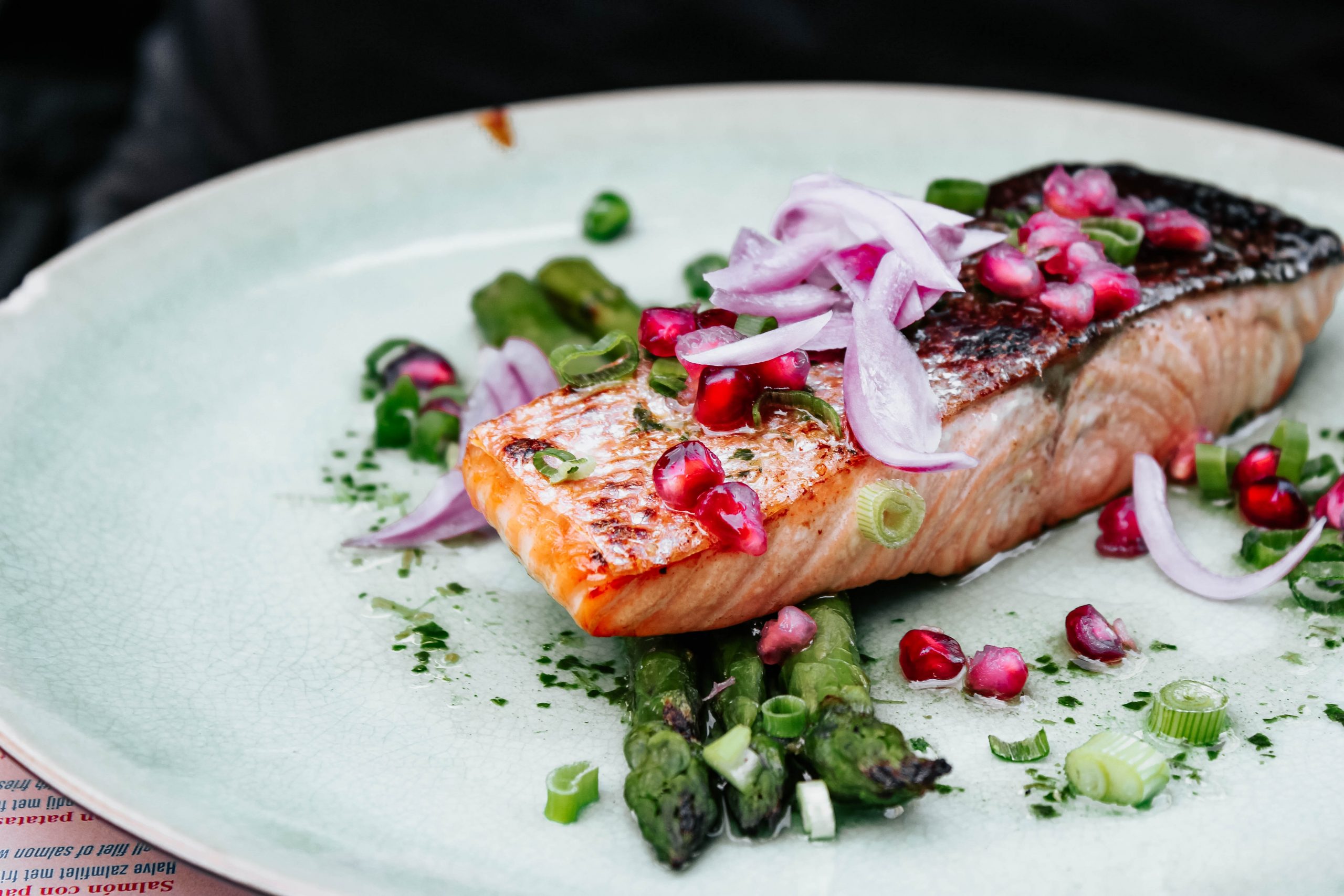
- Consuming plenty of colourful fruits and vegetables every day. A simple way to achieve this is to aim for at least 3 different colors on your plate at every meal!
- Consuming wholegrains (breads, cereals, rice, quinoa etc.)
- Cooking and using healthy fats like extra-virgin olive oil
- Eating a variety of different nuts and seeds
- Including legumes/beans in your diet (think of them like a vegetable with protein!)
- Plenty of seafood (with a particular emphasis on oily fish) at least twice each week
- Moderate consumption of dairy foods, eggs, and poultry (chicken, duck, turkey)
- Limiting your consumption of red meat
A Mediterranean style diet will ensure that you get all of the below nutrients that studies have shown are essential for quality eggs and sperm.
- Omega-3 fatty acids
- CoQ10
- Zinc
- Vitamin D
- Selenium
- Folate
- Vitamin E
- Vitamin C
- Lycopene
Studies have also shown that the wholegrains in a Mediterranean-style diet will aid the implantation of your fertilized egg!
3. Get a tailored supplement plan!
There are many ways that nutritional supplements can improve your chances of conceiving during IVF. However, it’s not as simple as taking your average prenatal.
A tailored supplement plan will take into account several factors including your:
- Age
- Medical history
- Reproductive history
- Current oral intake
- Weight and height
This will mean that you are taking supplements that have been individually tailored for your specific needs!
If you would like to learn how to optimize your nutrition before starting IVF, schedule your free 30 minute 1:1 strategy call with me!

References:
1.Mediterranean Diet 101: Meal Plan, Foods List, and Tips (healthline.com)
2. Maternal whole grain intake and outcomes of in vitro fertilization (nih.gov)

5 easy ways to reduce stress while trying to conceive
Embarking on a fertility journey can feel long and overwhelming at times. It is important to have strategies in place to help you cope with stress and anxiety, particularly if you are a Type-A personality that likes everything to be perfect at all times! These 5 tips will help you to reduce your stress while you are trying to conceive.
Try as best as you can to take things back-to-basics, by taking perfectionism off the table. Focusing on the basic pillars of health and wellness, can reduce stress without adding additional overwhelming tasks to your already very long to-do list.
If our stress levels remain high for too long, we can end up with elevated levels of cortisol, a hormone that is made up of the same building blocks as progesterone.
If our body is busy focusing on making cortisol, it places less importance on progesterone production, leading to a reduced supply. This can lead to several negative side-effects, particularly in respect to fertility including:
- Estrogen dominance
- Decreased ability to conceive
- Difficulty with mood stabilization
Progesterone helps us to grow a thick uterine lining which is then shed during menstruation. If we don’t have enough progesterone, then we end up with a lighter period, and a thinner uterine lining to support healthy implantation.
So we can see just how big of an impact stress can have on our ability to conceive!
Try these 5 easy ways to reduce your stress while you are trying to conceive:
-
Ensure you get regular movement
Be sure to move your body daily, even if it is in a very gentle way. Research has shown time and time again, that exercise is incredibly beneficial for stress and our mental health as a whole. Try activities like yoga, walking, and tai-chi to get your blood flowing.
2. Get enough sleep
Take this time to create a relaxing night time routine to help you unwind and get adequate sleep. Try taking time off devices to read, listening to a podcast, trying a mindfulness exercise or talking to a loved one. Aiming for 7 to 8 hours of sleep each night will help your body to get the rest it needs, without adding additional stress hormones into the mix.
3. Connect with others
Remind yourself of the supportive community that you have around you on this journey. Reach out to friends, family, support services at your fertility clinic or a counselling service if you need to. Research has shown that good social supports have a number of protective effects on our health (all of which are beneficial for improving our chances of conceiving) including:
- Decreased blood pressure
- Normal heart rate
- Reduced cortisol levels
4. Keep busy!
Type-A people are prone to overthinking and dwelling on the negative. Staying busy during your fertility journey can help you to stay positive and not focus on the things that we can’t control.
Take up a new hobby, clean out that cupboard, cook a new recipe or plan a day trip to somewhere you haven’t been before! Keep your mind and hands busy as often as you can to help reduce your stress.
5. Reframe your thoughts
Reminding yourself of the strength it has taken you to get to this point can be helpful for Type-A personalities. Try to avoid dwelling on negatives and focus on the facts. Spending time in a negative space will only make the process feel harder. Writing down your thoughts and linking them with facts can be a helpful visual and can help you to break negative thought processes.
For example, if you regularly think “I’m not meant to be a mother, this will never happen for me”, counteract this thought with several facts for example:
- I have several caring and motherly instincts and that is clearly seen in how I care for my partner and friends
- This may not happen right now, but that does not mean it will never happen
If you try these tips and are still struggling to find enough support while you are trying to conceive, book your free 30 minute 1:1 strategy call with me to learn how I can support you using functional nutrition, specialty lab testing, and targeted supplements. Can’t wait to speak to you!

References:
This past week I asked my Insta-fam what you all were interested to learn more about, and most of you said morning routines! I’m really happy about that, because creating a mindful morning routine has been one of the best healthy hacks I started in 2018. And it’s no surprise that some of the world’s most successful people attribute having a solid morning routine to their success.
Why Morning Routines Are a Powerful Habit to Keep
Having a morning routine is a habit, and the more you do it, the easier or more intuitive it becomes. If you haven’t read my post on how to create and stick to habits, go check it out first and be sure to grab my free habits tracker while you’re there!
Now, morning routines are not just about waking up, brushing your teeth, drinking coffee, and heading out the door. Because let’s face it, most of us do that any way. This is about going deeper, and being intentional with your morning to set yourself up for success for the rest of the day.
Do you ever have a morning where you’ve snoozed one too many times, jump out of bed in a panic, hastily throw on whatever clothes you see first, and then grab a coffee on your way into work? How do you feel after a morning like that? Most likely frazzled, stressed, and not in a place to be creative and think outside the box.
The idea behind having a mindful morning is that you are calm, focused, and ready for your day by the time you arrive to work. Having time in the morning just for you, allows for time to de-stress and prioritize what is most important.
I’ll share with you my current morning routine, which is pretty tight to be honest because I’m doing my clinical internship at the moment, and I have to be at work by 7am. I’ll also show you my morning routine when I was working from home and would start around 8:45-9am.
Current Morning Routine:
5:30am Wake up using my sunrise alarm clock, turn on the electric kettle to heat some hot water for my lemon water and coffee. Brush teeth, splash face with ice cold water.
5:35 am Make my warm lemon water and protein coffee, bring both drinks back to my room and set my Insight timer for 10 minutes of meditation (I keep my phone on airplane mode in the morning to help minimize distractions from social media)
5:45 am Either write down or say out loud three things I’m grateful for. This helps to set my day off with a positive note.
5:50 am 10 minutes of light yoga and stretching to wake my body up more. I like Yoga with Adrienne’s videos on Youtube
6:00 am Get dressed (clothes are laid out from the night before), put some makeup on, and grab my lunch from the fridge (meals prepped from the night before)
6:15 am Head out the door and start my 45 minute commute to work
Now, this current morning routine is less than ideal for me TBH. But, I am still making sure to get in some meditation, movement, and gratitude journaling in first thing in the morning. I am pretty low-maintenance when it comes to work outfits, makeup, and hair so it really does only take me 15 minutes to get dressed and out the door.
If you need more time for this, make sure to be aware of how much time you truly need to get ready. I also wanted to share my morning routine from a couple months ago, because it was my *absolute* ideal.
Past Mindful Morning Routine:
6:00am Wake up, turn on the electric kettle to heat some hot water for my lemon water and protein coffee. Brush teeth, splash face with ice cold water.
6:05 am Make my warm lemon water and walk over to the living room and set my Insight timer for 10 minutes of meditation, lighting a candle or palo santo.
6:15 am Make my protein coffee, get dressed for the gym, and make my bed.
6:30-7:30am Workout at the gym down the street from my house – mix of strength training and cardio.
7:45am Back home, shower, get dressed for the day, and make breakfast (usually a green smoothie)
8:15am Write out my priorities list for the day as well as fill in my gratitude journal.
8:30am Start working from home!
I think both of these morning routines show you that whether you have 30 minutes or 2 hours in the morning, there is precious time to be taken advantage of. Instead of arriving to work flustered and unfocused, you can arrive having already accomplished some major things.
A good morning routine begins the night before. I will do another separate post about nighttime routines, because this will help set you up for success in the morning!
One of the most important things you can do to have a good morning routine without distractions is to keep your phone on airplane mode in the morning. I don’t turn on my phone on until I get in my car for Google Maps. This eliminates the distraction of checking Instagram or emails right in the morning, which immediately pulls your attention and focus away from the present moment.
Tips for Creating a Mindful Morning Routine:
-Set your alarm for even 10 minutes earlier in the morning. If you can’t seem to find time in the morning, start small. Remember, 5 minutes of meditation is better than none.
-Resist the urge to snooze! I’ll be the first to admit that I struggle with the snooze. But I started saying to myself: “you snooze, you lose” and for some reason it gets me out of bed! Try it and let me know if it works for you too!
-Start with one thing at a time. You know the fastest way to fail at this? Try and do everything at once! Seriously, pick ONE thing and stick with it for at least one week before adding on something else. I always recommend starting with meditation. If you need some inspiration, check out this post on my favorite meditation apps.
-Change with the seasons and don’t be afraid to allow your routine to change! Right now, I’m in a season of intense work. I’m doing my clinical internship to become a Registered Dietitian and the hours are insane. That’s okay. I’ve adjusted my routine to still include just a few of my favorite things and when I’m back to a more relaxed work schedule, I’ll likely shift back into morning workouts and having a slower morning.
-Just do it. Seriously. However many excuses you have, just try out one simple thing like writing down 3 things you’re grateful for, or 5 minutes of mindful breathing. Whatever it is, try it out and stick with it for at least 2 weeks before deciding it’s not for you. And of course, report back and let me know how it goes!
So what do you think? Do you have a morning routine you love, or are you going to try one of the things listed here? Let me know in the comments below so I can hear about your beautiful mindful morning routines!
xo,
The Preconception Playbook
This free playbook provides specific actionable tips to get started on your fertility journey, as well as what to avoid while you're trying to conceive.
Get the free playbook






